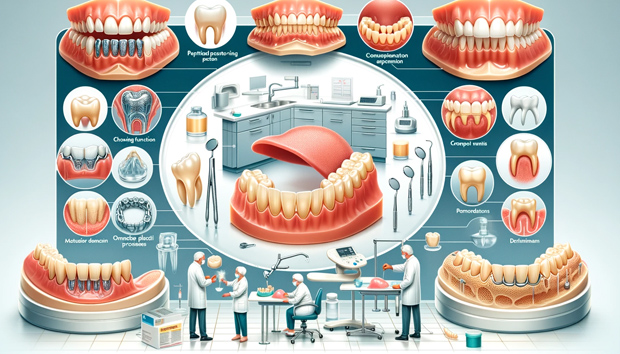1. What Are Removable Dentures and When Are They Used?
Introduction to Removable Dentures
Removable dentures are a common dental solution for replacing missing teeth. They can be partial, replacing a few teeth, or complete, replacing all teeth in a jaw. They are particularly used in cases of partial or complete adentia (tooth loss).
Indications for Use
- Partial Dentures: Used when one or more teeth are missing in either jaw. It is preferable to have at least four teeth in different groups for stability and to avoid overloading the abutment teeth.
- Complete Dentures: Ideal for individuals who have lost all their teeth in a jaw.
- Special Cases: In certain conditions, treatments may be required to improve the prosthetic field.
Advantages
- Non-invasive: No need for filing supporting teeth.
- Easy Maintenance: Can be removed for cleaning.
- Aesthetic: All-plastic prostheses offer a good aesthetic result.
- Improved Functionality: Restores chewing function and facial proportions.
2. How Do Removable Dentures Enhance Quality of Life?
Impact on Daily Life
Removable dentures significantly improve the quality of life for individuals with missing teeth. They enhance aesthetics, functionality, and overall well-being.
- Aesthetics: Restore the natural appearance of the smile.
- Chewing Ability: Allow for efficient food breakdown.
- Speech Improvement: Help in clearer articulation after adaptation.
- Self-Esteem: Boost confidence and social interaction.
3. Are There Any Disadvantages or Complications with Removable Dentures?
Potential Challenges
While removable dentures offer numerous benefits, they also come with potential drawbacks and complications that patients should be aware of.
- Adaptation Period: Requires time to get used to.
- Maintenance: Need regular cleaning and care.
- Fit Issues: May require adjustments over time.
4. What Types of Removable Dentures Are Available?
Varieties of Dentures
There are various types of removable dentures, each with its own set of advantages.
- All-Plastic Prostheses: Economical and aesthetic.
- Metal Framed Dentures: Offer greater comfort and stability.
5. How Do I Know if Removable Dentures Are Right for Me?
Determining Suitability
Consultation with a dental professional is crucial to determine if removable dentures are the best solution for your dental needs.
- Dental Examination: Assess the condition of remaining teeth and jawbone.
- Personal Needs: Consider lifestyle, comfort preferences, and aesthetics.
Summary Table
| Feature | Partial Dentures | Complete Dentures |
|---|---|---|
| Use Case | Replace one or more teeth | Replace all teeth in a jaw |
| Requirements | At least 4 different group teeth | Well-preserved alveolar processes |
| Advantages | Non-invasive, good aesthetics | Restores full dental function |
| Types | All-plastic, metal framed | All-plastic, metal framed |
FAQ
What is the main purpose of removable dentures?
Removable dentures are designed to replace missing teeth, restore chewing function, improve aesthetics, and enhance speech.
How long does it take to adapt to removable dentures?
The adaptation period varies, but most individuals adjust to their dentures within a few weeks to a few months.
Can I eat normally with removable dentures?
Yes, removable dentures allow you to eat most foods, though some adaptation in the way you chew might be necessary.
How do I care for my removable dentures?
Removable dentures require daily cleaning with specific denture cleaners and regular check-ups with your dentist.
Are removable dentures noticeable?
Modern dentures are designed to look natural and are often not noticeable.
Can removable dentures improve my speech?
Yes, after an adaptation period, dentures can help improve articulation and clarity of speech.
Do removable dentures need to be replaced?
Over time, dentures may require adjustments or replacement due to changes in the mouth structure and wear.


Leave a Reply